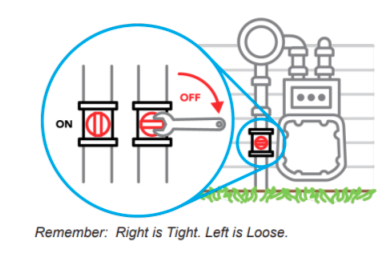By Amy Cloud August 21, 2025 1:18 pm
In Emergency Management, we talk about preparing during “blue sky days” for the “gray sky days” when disasters emerge.
Here’s a “blue sky” topic that’s hugely important when the “gray sky” day hits: do you know where the turn-off is for the utilities that heat your home? Because when we’re hit by an earthquake or tsunami or even a bolt of lightning, those utilities add danger.
Whether your home is heated by natural gas, electricity or propane, you need to know how to keep safe from the potential of explosion or fire. Can you shut them off? Here’s why it matters.
NATURAL GAS leaks and explosions can cause fires following a major earthquake, as pipes are damaged. If you have natural gas and hear a hissing sound, smell gas (the odor of rotten eggs), or you see the meter is spinning oddly, first get everyone out of the house and open windows for ventilation. Then:
Using a crescent wrench, at least 12” long
Turn the shut-off valve 90 degrees to the right (a quarter turn)
Note, if the valve is rusted open, do NOT put lubricant on it (could corrode the rings that allow the valve to turn
 Courtesy of the Washington EMD “Prepare in a Year” website
Courtesy of the Washington EMD “Prepare in a Year” website
ELECTRICAL sparks can ignite natural gas. They can be caused by frayed, cracked or damaged electrical wires. To keep cords safe:
Do not have electrical cords under carpets or in high traffic areas
Do not staple or nail cords on any surface
Have damaged cords, plugs or housings replaced
Make sure that you – and everyone in your household – knows where the electricity circuit box is and how to shut off electricity at the box. (For instance, shut off individual circuits before shutting off the main circuit breaker.)
PROPANE tanks are highly flammable. Being as safe as possible starts with where – and how – the tank is stored.
Do not store propane tanks inside (not even in garages) or near a grill
When not in use, keep the tank valve turned OFF
Always store the tank upright and in an area that will never reach 125 degrees
Do not use propane tanks as heaters
Don’t try to repair a damaged tank or valve
According to the NOAA National Weather Service, we’ve got a few “blue sky” days coming up this month. How about putting them to good use?
Amy Cloud is the Public Information Officer (PIO) for the Sheriff’s Office Division of Emergency Management. She was born and raised locally, leaving for Whitman College and work in Seattle, Knoxville and Washington, D.C. She returned to work as Supervising News Producer and reporter for KVOS-TV’s NewsView before switching to communications for WWU, PeaceHealth and the City of Bellingham. She also co-chairs the Community PIO Group and is a member of the Governor’s Committee on Disability Issues.
